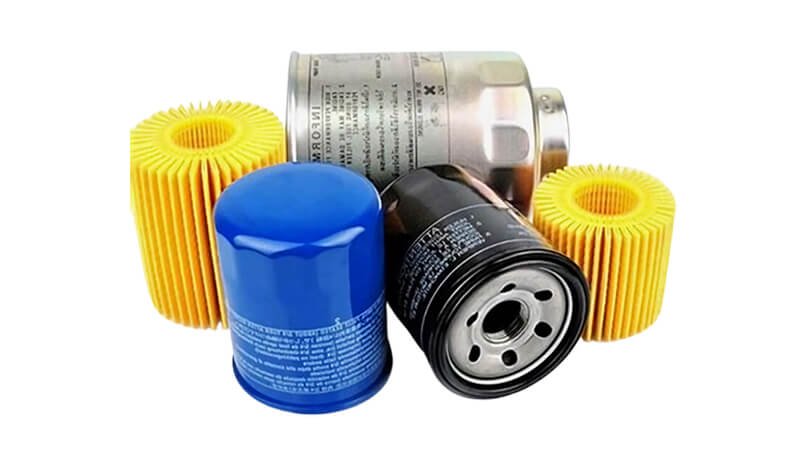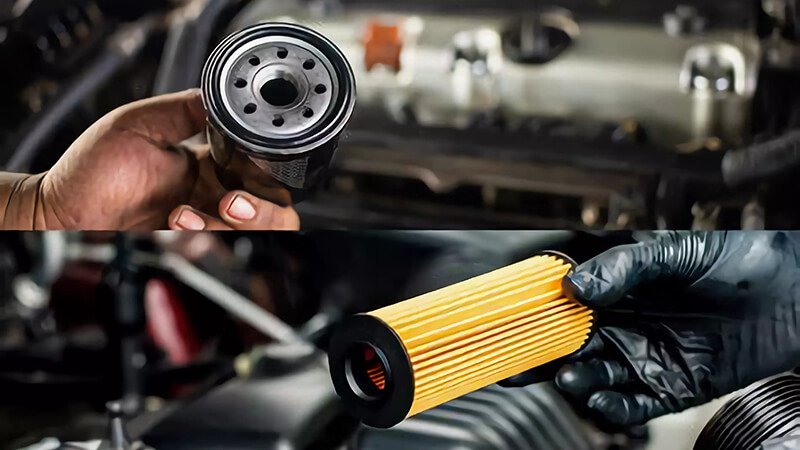Have you ever wondered if you could save a bit of money by reusing your car's oil filter? While it might seem like a good idea to reuse an oil filter after draining the oil, it’s generally not recommended. Let's explore why and what risks are involved.
Reusing an oil filter after draining the oil is not recommended, especially for most modern disposable filters. These filters are designed to trap contaminants, and once clogged, they can cause the oil bypass valve to open, leading to potential engine damage.
Now that we know reusing oil filters can be risky, let’s dive deeper into why oil filters should not be reused and explore common questions surrounding this topic.

Can you drain and reuse an oil filter?
When performing routine car maintenance, many people wonder if they can simply drain an oil filter and reuse it. The idea of saving time and money might be tempting, but there’s more to consider when it comes to the functionality of the filter.
Draining an oil filter might seem like a cost-effective solution, but once drained, the filter’s effectiveness is compromised. The filter media is designed to trap contaminants, and once it’s been used, it loses its ability to provide proper filtration, risking engine performance.
Oil filters are built to serve a very specific purpose: filtering out dirt, metal shavings, and other contaminants from the oil before it circulates through the engine. Over time, the filter media becomes clogged with debris. When you drain the oil from the filter, you're only removing the oil, but the contaminants remain trapped in the filter’s media.
Why it’s not advisable to reuse an oil filter
Once the filter media becomes clogged, it cannot effectively trap new contaminants. In most cases, this leads to one of two things: the oil bypass valve opens, or oil flows through the filter without being properly filtered. If the bypass valve opens, unfiltered oil circulates through the engine, which can cause serious long-term damage, like increased wear on engine components. Even without the bypass valve opening, reusing a clogged filter1 means your engine oil will no longer be properly filtered, potentially leading to increased engine wear and reduced performance.
Oil filter design and limitations
Most modern oil filters2 are designed to be disposable. Their structure and materials are optimized for one-time use. The filtration media within these filters becomes less effective as it traps contaminants, and after the oil is drained, it no longer offers the same level of protection for the engine. While some people might consider cleaning and reusing the filter, manufacturers typically advise against it because of the risks involved.
Table 1: Oil Filter Structure and Function
| Component | Function | Effect of Reuse |
|---|---|---|
| Filter Media | Traps dirt, debris, metal shavings, and contaminants from the oil | Once clogged, its ability to trap particles is reduced |
| Bypass Valve | Ensures oil flows through the engine if the filter is clogged | Opens when filter is clogged, allowing unfiltered oil |
| Rubber Seal | Ensures a tight fit to prevent oil leakage | Can lose effectiveness after reuse, causing oil leakage |

Can I use the same oil filter twice?
Using the same oil filter twice might seem like a way to save some cash, but it’s not something that most car manufacturers would recommend. Let’s take a closer look at why this practice can be dangerous.
Using the same oil filter twice is generally not a good idea. After the first oil change, the filter’s capacity to trap contaminants is exhausted, and reusing it can allow dirt and debris to circulate through the engine, risking damage.
The design of an oil filter3 is meant for single-use only. Each time the engine oil is replaced, the oil filter captures a significant amount of contaminants. The filter media, typically made from materials like paper or synthetic fibers, holds onto particles like dirt, metal filings, and carbon. As oil flows through, these contaminants are trapped, preventing them from circulating through the engine.
What happens if you reuse an oil filter?
If you reuse an oil filter, the media inside may have already absorbed as many contaminants as it can handle. Over time, it may become clogged, and its efficiency will decrease significantly. This means that, instead of filtering out harmful particles, the oil filter will allow them to flow through into your engine. This could result in faster wear of internal engine components, decreased performance, and potentially costly repairs.
The role of the oil bypass valve
Oil filters often have a built-in bypass valve4 to ensure that oil continues circulating if the filter becomes clogged. However, if the filter is reused and clogged again, the bypass valve will open, allowing unfiltered oil to circulate through the engine. This is a worst-case scenario because it can cause contaminants to circulate freely, leading to rapid engine wear5.
Table 2: Risks of Reusing an Oil Filter
| Risk | Description |
|---|---|
| Decreased Filtration | Filter media becomes clogged, reducing its ability to trap harmful contaminants |
| Bypass Valve Activation | Causes unfiltered oil to circulate, damaging engine components |
| Engine Wear | Reduced filtration leads to metal shavings, dirt, and debris harming the engine |

Do you change oil filter after draining oil?
Changing the oil filter after draining the oil is a standard practice when performing an oil change. But why is this step so important? Let’s take a look at why the oil filter should always be replaced during an oil change.
It’s essential to change the oil filter every time you drain the oil because the filter traps contaminants. If you reuse it, you risk introducing debris into the engine, potentially leading to engine damage or reduced efficiency.
Changing the oil filter is an important part of regular car maintenance. When the oil is drained, the filter is removed and replaced with a new one to ensure that fresh oil is adequately filtered before it circulates through the engine.
Why changing the oil filter is essential
The oil filter6 plays a crucial role in maintaining engine health. It captures dirt, carbon, metal shavings, and other harmful particles that accumulate in the oil. If the filter is not changed, the contaminants will continue to circulate in the engine, leading to premature wear of engine components. In addition, a new oil filter ensures that the oil is clean and free of debris, which can improve engine performance7 and extend its lifespan.
Filter capacity and oil changes
An oil filter has a limited capacity for contaminants. As the oil changes, the filter’s ability to trap contaminants decreases, and it becomes less effective at keeping the oil clean. This is why it’s necessary to replace the filter each time the oil is drained, ensuring that the engine continues to receive clean oil that protects its internal components.
Table 3: Benefits of Changing the Oil Filter Regularly
| Benefit | Description |
|---|---|
| Improved Engine Health | New filters remove contaminants that could cause engine damage |
| Better Oil Efficiency | Fresh filters maintain clean oil, improving engine performance |
| Extended Engine Lifespan | Regular filter changes reduce wear, leading to longer engine life |

Can I take an oil filter off and put it back on?
Another common question many car owners ask is whether it’s safe to remove an oil filter and then reinstall it. Let’s look at the risks involved in this practice.
Reinstalling an oil filter is not recommended. Once removed, the filter’s seal and filtering media may no longer function properly, leading to potential leaks or insufficient filtration.
Oil filters are designed to be installed once and replaced periodically. When you remove the filter, the rubber seal that ensures a tight fit might lose its effectiveness, leading to oil leaks8. Furthermore, the internal media that traps contaminants could become damaged or lose its filtering capabilities.
Why reinstalling an oil filter is risky
After an oil filter has been removed, it may no longer form a proper seal when reinstalled. This could cause oil to leak, leading to a drop in oil levels and potential damage to engine components. Additionally, the filter media may become compromised after the initial installation, and reusing it can result in unfiltered oil circulating through the engine.
The importance of using a new filter
For these reasons, it is always best to install a new oil filter9 when changing the oil. A fresh filter ensures that the engine is properly protected, and there’s no risk of contamination or leakage. Even if you’re trying to save money, reinstalling an oil filter is not worth the potential risk to your vehicle’s engine.
Table 4: Risks of Reinstalling an Oil Filter
| Risk | Description |
|---|---|
| Oil Leaks | Improper seal formation can lead to oil leakage, lowering oil levels |
| Reduced Filtration | Filter media may be damaged, leading to ineffective oil filtration |
| Engine Damage | Unfiltered oil can circulate, causing increased engine wear |

Conclusion
In conclusion, reusing an oil filter10 or reinstalling it after removing it is not recommended. Oil filters are designed for single-use, and once they’ve been used, they lose their ability to effectively filter contaminants. For the safety and longevity of your vehicle’s engine, it’s important to change the oil filter every time you change the oil. Investing in a new, high-quality oil filter ensures that your engine remains well-protected, allowing it to perform efficiently for years to come.
-
Learn about the serious risks associated with clogged oil filters to protect your engine from damage. ↩
-
Understanding oil filter maintenance can help prolong engine life and improve performance. Explore this resource for expert tips. ↩
-
Understanding the function of an oil filter can help you appreciate its importance in maintaining engine health. ↩
-
Learning about the bypass valve's role can provide insights into engine protection mechanisms during oil filtration. ↩
-
Exploring the causes of engine wear can help you take proactive measures to extend your engine's lifespan. ↩
-
Understanding the role of the oil filter can help you maintain your vehicle's engine health effectively. ↩
-
Explore how a clean oil filter can enhance your engine's efficiency and longevity. ↩
-
Exploring the impact of oil leaks on engine performance can highlight the importance of proper oil filter maintenance. ↩
-
Understanding the risks associated with old oil filters can help you make informed decisions for your vehicle's maintenance. ↩
-
Runex auto provivde different kinnds of oil filter for your brands,, clisk this link to get your product and best price. ↩












